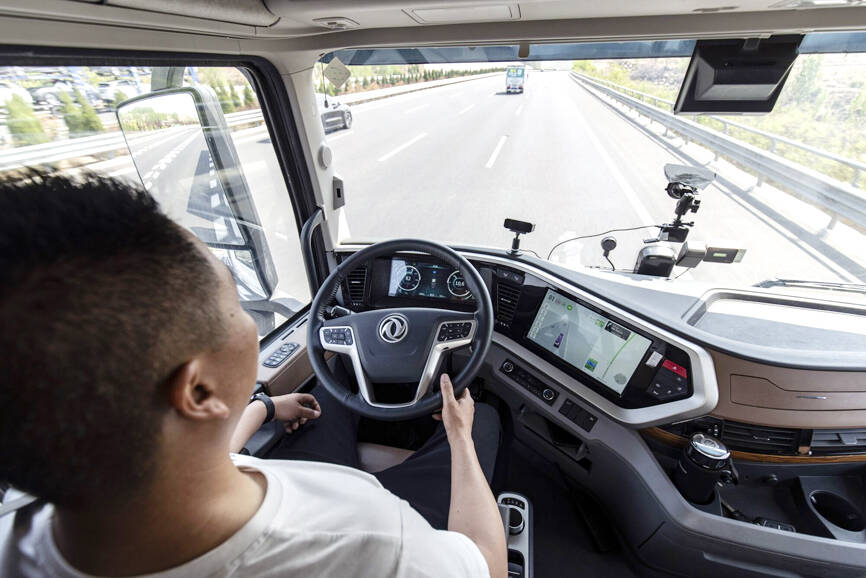The US Department of Commerce is expected to propose a bar on Chinese software in autonomous and connected vehicles in the coming weeks, sources said.
US President Joe Biden’s administration plans to propose a rule that would bar Chinese software in vehicles in the US with Level 3 automation and above, which would also result in a ban on the testing of Chinese-produced autonomous vehicles on US roads.
The administration would also propose barring vehicles with Chinese-developed advanced wireless communications abilities modules from US roads, the sources added.

Photographer: Qilai Shen, Bloomberg
Under the proposal, automakers and suppliers would need to verify that none of their connected vehicle or advanced autonomous vehicle software was developed in a “foreign entity of concern” such as China, the sources said.
Asked for a comment, a department spokesperson on Sunday said that the department “is concerned about the national security risks associated with connected technologies in connected vehicles.”
The department’s Bureau of Industry and Security would propose a rule that “will focus on specific systems of concern within the vehicle. The industry will also have a chance to review that proposed rule and submit comments,” the spokesperson said.
Meanwhile, a representative for the Chinese embassy in Washington said electric vehicles are a globalized industry.
“Only division of labor and cooperation can bring mutual benefits, and only fair competition can bring technological progress,” the representative said. “China urges the US to abide by market principles and international trade rules, and create a level playing field for companies from all countries. China will firmly defend its lawful rights and interests.”
The White House and the US Department of State on Wednesday hosted a meeting with allies and industry leaders to “jointly address the national security risks associated with connected vehicles,” the department said.
The meeting included officials from the US, Australia, Canada, the EU, Germany, India, Japan, South Korea, Spain and the UK who “exchanged views on the data and cybersecurity risks associated with connected vehicles and certain components.”
Also known as conditional driving automation, Level 3 includes technologies that allow drivers to engage in activities behind the wheel, such as watching movies or using smartphones, but only under limited conditions.
A group of US lawmakers in November last year raised concerns about Chinese companies collecting and handling sensitive data while testing autonomous vehicles in the US and asked questioned major Chinese companies.
In letters, the group said that in the 12 months ended November 2022, Chinese autonomous vehicle companies test drove more than 724,205km in California. US Secretary of Transportation Pete Buttigieg in July last year said his department had national security concerns about Chinese autonomous vehicle companies in the US.
The US administration is worried that connected vehicles using driver monitoring systems would listen in on or record conversations of occupants, or take control of the vehicle itself.
“The national security risks are quite significant,” US Secretary of Commerce Gina Raimondo said in May. “We decided to take action, because this is really serious stuff.”

Vincent Wei led fellow Singaporean farmers around an empty Malaysian plot, laying out plans for a greenhouse and rows of leafy vegetables. What he pitched was not just space for crops, but a lifeline for growers struggling to make ends meet in a city-state with high prices and little vacant land. The future agriculture hub is part of a joint special economic zone launched last year by the two neighbors, expected to cost US$123 million and produce 10,000 tonnes of fresh produce annually. It is attracting Singaporean farmers with promises of cheaper land, labor and energy just over the border.

US actor Matthew McConaughey has filed recordings of his image and voice with US patent authorities to protect them from unauthorized usage by artificial intelligence (AI) platforms, a representative said earlier this week. Several video clips and audio recordings were registered by the commercial arm of the Just Keep Livin’ Foundation, a non-profit created by the Oscar-winning actor and his wife, Camila, according to the US Patent and Trademark Office database. Many artists are increasingly concerned about the uncontrolled use of their image via generative AI since the rollout of ChatGPT and other AI-powered tools. Several US states have adopted

A proposed billionaires’ tax in California has ignited a political uproar in Silicon Valley, with tech titans threatening to leave the state while California Governor Gavin Newsom of the Democratic Party maneuvers to defeat a levy that he fears would lead to an exodus of wealth. A technology mecca, California has more billionaires than any other US state — a few hundred, by some estimates. About half its personal income tax revenue, a financial backbone in the nearly US$350 billion budget, comes from the top 1 percent of earners. A large healthcare union is attempting to place a proposal before

KEEPING UP: The acquisition of a cleanroom in Taiwan would enable Micron to increase production in a market where demand continues to outpace supply, a Micron official said Micron Technology Inc has signed a letter of intent to buy a fabrication site in Taiwan from Powerchip Semiconductor Manufacturing Corp (力積電) for US$1.8 billion to expand its production of memory chips. Micron would take control of the P5 site in Miaoli County’s Tongluo Township (銅鑼) and plans to ramp up DRAM production in phases after the transaction closes in the second quarter, the company said in a statement on Saturday. The acquisition includes an existing 12 inch fab cleanroom of 27,871m2 and would further position Micron to address growing global demand for memory solutions, the company said. Micron expects the transaction to